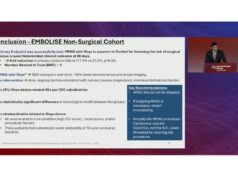 Arsenal Medical has announced late-breaking data from the EMBO-02 clinical study evaluating NeoCast—a next-generation, shear-responsive liquid embolic agent—in the treatment of patients with chronic subdural haematoma (cSDH) via middle meningeal artery embolisation (MMAe). Research presented across multiple sessions at the Society of NeuroInterventional Surgery (SNIS) annual meeting (14–18 July, Nashville, USA) showed that all patients met primary safety and feasibility endpoints, in addition to demonstrating that NeoCast can be administered painlessly and leads to rapid haematoma resorption.
Arsenal Medical has announced late-breaking data from the EMBO-02 clinical study evaluating NeoCast—a next-generation, shear-responsive liquid embolic agent—in the treatment of patients with chronic subdural haematoma (cSDH) via middle meningeal artery embolisation (MMAe). Research presented across multiple sessions at the Society of NeuroInterventional Surgery (SNIS) annual meeting (14–18 July, Nashville, USA) showed that all patients met primary safety and feasibility endpoints, in addition to demonstrating that NeoCast can be administered painlessly and leads to rapid haematoma resorption.
A total of 15 patients with cSDH have been enrolled in EMBO-02 across three sites in Australia. The initial cohort of 10 patients allowed either general anaesthesia or conscious sedation, while the second cohort of five patients specified the use of conscious sedation, according to Arsenal Medical.
Highlights from the study’s results to date include 87% of patients undergoing embolisation without adjunctive surgery; 100% target vessel occlusion alongside no non-target embolisations; and no NeoCast-related adverse events.
In the initial, 10-patient cohort, 60% and 90% of patients experienced complete haematoma resolution at three and six months, respectively, while more than 80% of patients saw their clinical outcome measures—for example, modified Rankin scale (mRS), visual analogue scale (VAS) and Markwalder grading scale—improved or unchanged from baseline.
Across five patients in the second cohort, MMAe with NeoCast was completed under conscious sedation with no patients reporting pain during the injection, and no reports of increased headache at 24 hours post-embolisation.
“NeoCast’s unique material characteristics have translated from preclinical studies to the EMBO-01 first-in-human study in hypervascular brain tumours, and now to the treatment of cSDH in EMBO-02,” said EMBO-02 principal investigator Lee-Anne Slater (Monash Health, Melbourne, Australia), who presented late-breaking findings from the study at SNIS 2025. “Results from these studies demonstrate the potential of NeoCast to provide deep distal penetration in multiple clinical scenarios and suggest benefits in speed of haematoma resolution for patients suffering from cSDH.”
“NeoCast is truly a next-generation liquid embolic agent,” added Tim Phillips (Sir Charles Gairdner Hospital, Perth, Australia). “The ease of use, controllability, and the lack of pain during or after the injection, are such differentiating factors for NeoCast over currently available liquid agents.”
“We designed NeoCast to be a pain-free, non-adhesive biomaterial to overcome the limitations of existing liquid embolic technologies,” stated Arsenal Medical chief executive officer (CEO) Upma Sharma. “These clinical results provide early reinforcement of what we set out to achieve, demonstrating excellent performance with an easy-to-use agent. As NeoCast continues through its robust clinical research programme, we’re excited about the potential impact for patients and physicians across a range of neurovascular and peripheral indications.”









